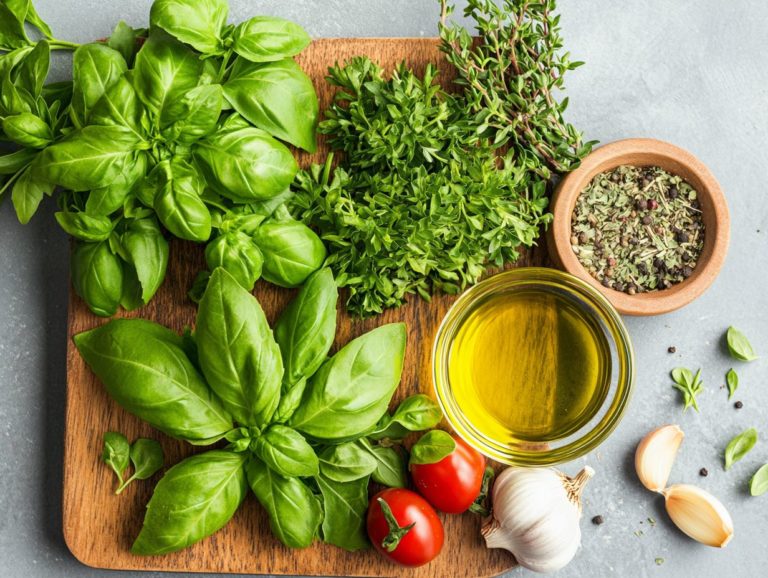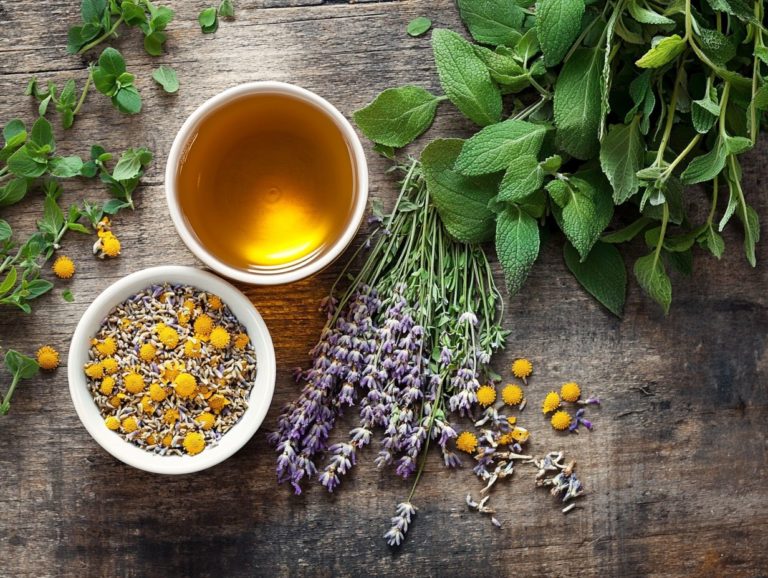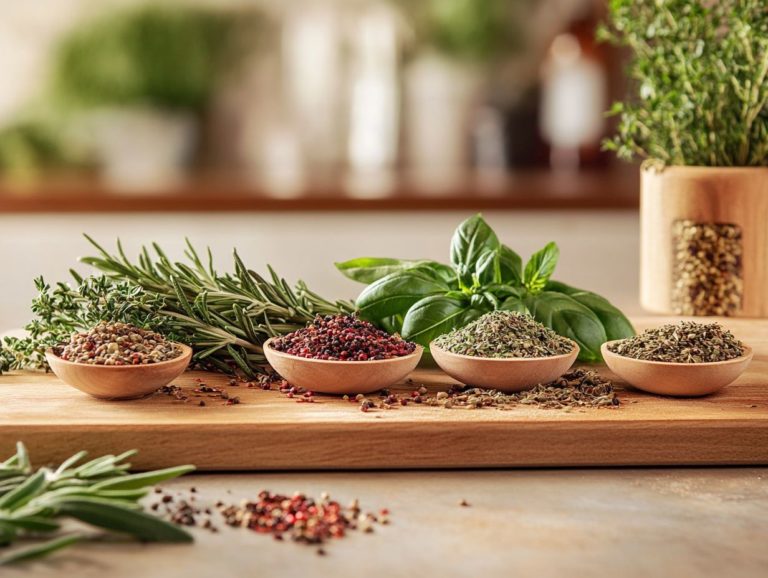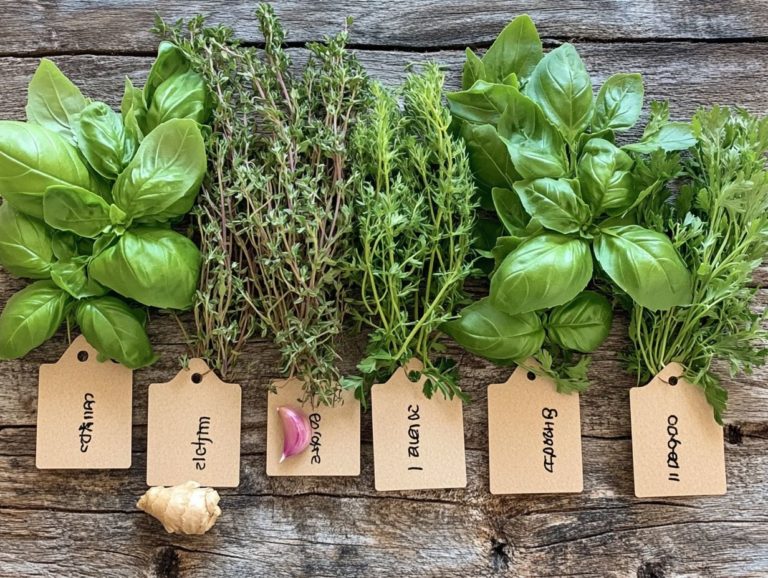5 Herbs with Antioxidant Properties
In today s fast-paced world, prioritizing your health is more crucial than ever. Adding natural remedies can truly elevate your wellness journey.
This article explores five remarkable herbs: turmeric, green tea, cinnamon, rosemary, and ginger. They are celebrated for their impressive antioxidant properties. You ll learn what antioxidants are substances that help protect your body from harm and how vital they are in battling harmful free radicals that threaten your health.
You will also find practical tips on seamlessly adding these herbs to your diet, highlights of their additional benefits, and discussions on any potential side effects. Get ready to discover how easy it is to boost your well-being with these simple yet powerful ingredients!
Contents
- Key Takeaways:
- 1. Turmeric
- 2. Green Tea
- 3. Cinnamon
- 4. Rosemary
- 5. Ginger
- What Are Antioxidants and Why Are They Important for Health?
- Frequently Asked Questions
- What are the top 5 herbs with antioxidant properties?
- How do these herbs help fight against oxidative stress?
- Can these herbs be used as a natural alternative to antioxidant supplements?
- Are these herbs safe for consumption?
- What other health benefits do these herbs offer?
- How can I incorporate these herbs into my daily routine?
Key Takeaways:
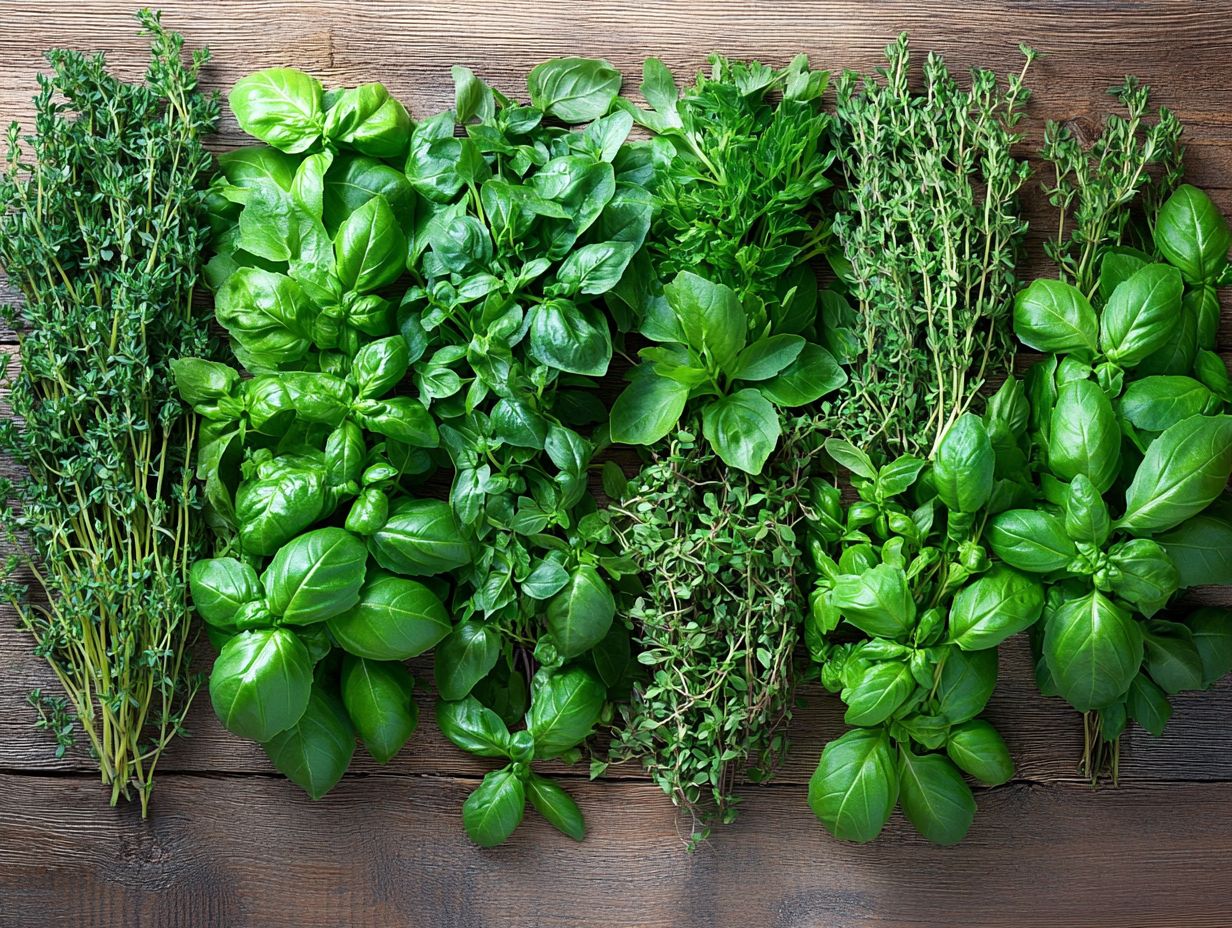
- Turmeric, green tea, cinnamon, rosemary, and ginger are herbs with powerful antioxidant properties.
- Antioxidants are important for health because they help fight free radicals and protect cells from damage.
- These herbs have great antioxidant benefits and are easy to add to your meals.
1. Turmeric
Turmeric, that vibrant yellow spice you often encounter in Mediterranean cuisine, is celebrated for its remarkable health benefits. Curcumin is the key compound in turmeric that gives it power. It is known for its potent antioxidant properties that help combat free radicals and oxidative stress. This may play a significant role in cancer prevention and overall wellness.
Research underscores that curcumin doesn t just protect your cells from oxidative damage; it also boosts your body s natural defense mechanisms. Numerous studies suggest that this extraordinary spice may inhibit tumor growth and metastasis in various cancers, including breast and colorectal. Its anti-inflammatory properties are vital for maintaining joint health and easing discomfort associated with chronic conditions.
By adding turmeric to your daily diet, you might find yourself enjoying improved cognitive function and cardiovascular health. It s truly an excellent addition to a balanced lifestyle focused on disease prevention. Try adding turmeric to your meals today and feel the difference!
2. Green Tea
Green tea, known for its rich abundance of antioxidants and phytochemicals, stands out as a remarkable ally in enhancing immune function and promoting overall health improvements. Green tea is a staple in herbal remedies and wellness routines.
Among its most impressive components are catechins, a type of flavonoid that has garnered significant attention for its potential to reduce cancer risk and bolster cardiovascular health. These potent antioxidants work diligently to combat oxidative stress and inflammation within your body, aiding in lowering cholesterol levels and improving blood vessel function.
To truly enjoy the benefits, you can seamlessly weave green tea into your daily routine. Whether you savor a warm cup in the morning, indulge in a refreshing iced beverage in the afternoon, or even blend it into your smoothies for an extra health boost, incorporating green tea has never been easier. Make green tea a part of your day and feel energized!
3. Cinnamon
Cinnamon, that aromatic spice with remarkable antioxidant properties, is not just a flavor booster in your culinary creations; it also holds promising health benefits, such as regulating blood sugar levels, making it a worthy addition to your healthy diet.
This spice has garnered attention for its ability to enhance insulin sensitivity, which is particularly advantageous for those managing diabetes or pre-diabetic conditions. Adding it to your daily meals is a breeze. You might consider:
- Sprinkling cinnamon on your oatmeal,
- Adding it to a refreshing smoothie,
- Mixing it into your favorite baked goods.
Not only does it enhance flavor, but it also elevates nutritional value. Its naturally sweet profile allows you to cut back on sugar in your recipes, perfectly aligning with healthier eating habits. Beyond its blood sugar-stabilizing effects, the high antioxidant content in cinnamon contributes to overall cellular health, providing a well-rounded approach to your wellness journey. Start using cinnamon today and taste the difference!
4. Rosemary
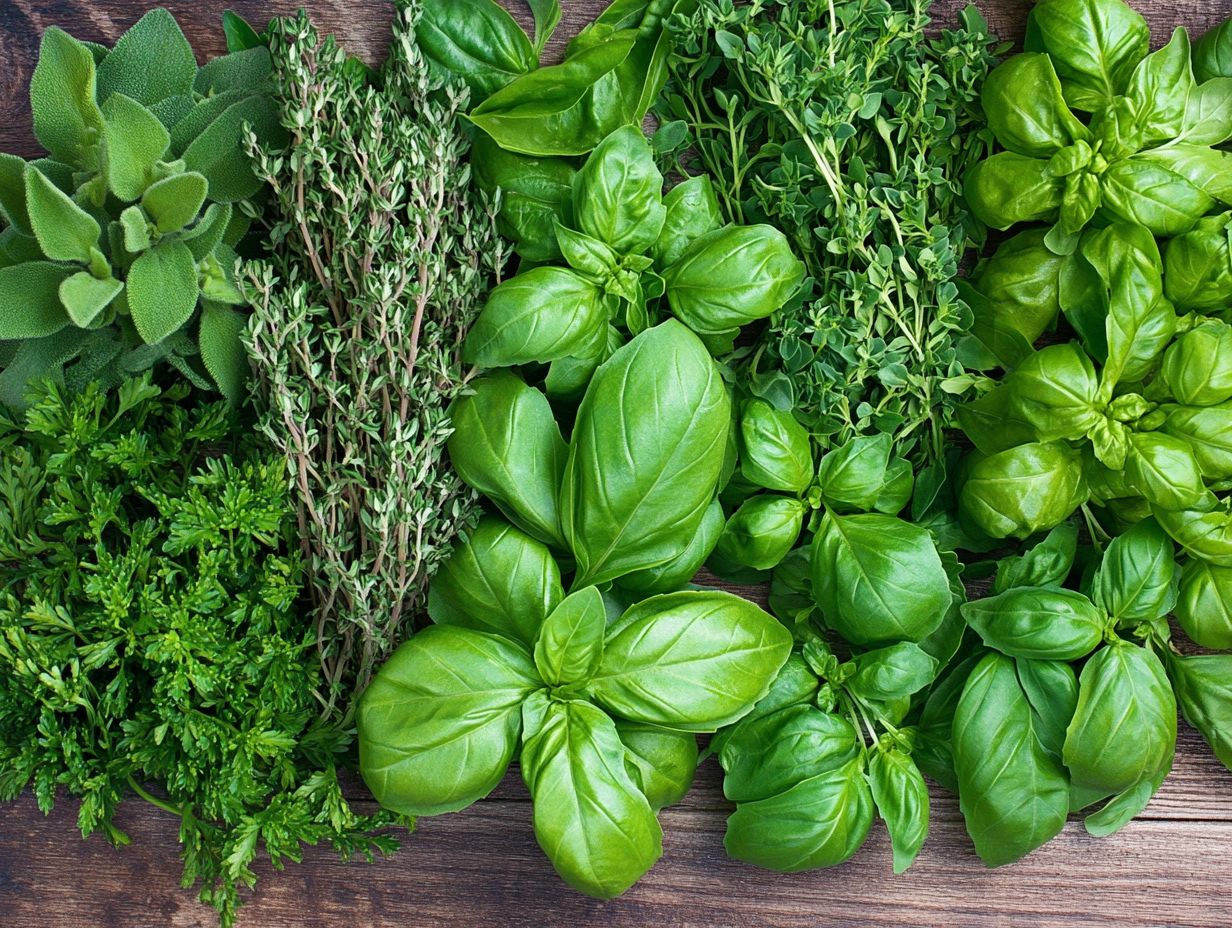
Rosemary, that aromatic herb hailing from the Mediterranean, is truly a gem packed with antioxidants. It elevates the flavor of your culinary creations and bolsters your immune function.
Rosemary also boasts impressive anti-inflammatory properties, making it a great partner in herbal remedies. Antioxidants are your body’s defenders. They neutralize harmful free radicals and may lower your risk of chronic diseases like cancer and heart disease.
Traditionally, rosemary has served as a go-to in various herbal remedies. It addresses everything from digestive woes to memory enhancement, showcasing its remarkable versatility.
It helps support joint health. This can ease discomfort from conditions like arthritis.
As more individuals seek natural alternatives for wellness, this delightful herb not only spices up your dishes but also offers many health benefits worth exploring.
5. Ginger
Ginger, a cherished spice celebrated for its unique flavor, holds a place of esteem for its impressive array of health benefits. It boasts potent antioxidant effects and powerful anti-inflammatory properties that may assist in alleviating various health conditions.
This aromatic root is brimming with compounds that fight oxidative stress (an imbalance that can harm your cells), a known contributor to chronic diseases and aging. The antioxidants in ginger, particularly gingerols and shogaols, play a vital role in neutralizing free radicals within your body.
You may already be aware of its digestive advantages; ginger can soothe the stomach and reduce nausea. It also promotes healthy digestion by boosting the production of digestive enzymes.
Its anti-inflammatory qualities are remarkable as well. Research suggests it can reduce muscle pain and soreness while potentially aiding in managing conditions like arthritis and heart disease.
What Are Antioxidants and Why Are They Important for Health?
Antioxidants are essential compounds that protect your body from oxidative stress. This imbalance occurs when free radicals outnumber antioxidants, leading to cellular damage and contributing to various health conditions, including cancer, cardiovascular disease, and diabetes.
Incorporating antioxidant-rich foods and herbal remedies into your diet is vital for optimal immune function and overall health benefits. These remarkable compounds work by neutralizing free radicals unstable molecules that can wreak havoc on your cells if left unchecked.
Common sources of antioxidants include vibrant fruits and vegetables such as:
- Blueberries
- Spinach
- Sweet potatoes
These not only boost your body s defenses but also supercharge your vitality. Nuts, seeds, and even beverages like green tea serve as excellent sources of these protective agents.
The significance of antioxidants extends to managing health conditions exacerbated by oxidative stress, such as neurodegenerative diseases and inflammation. Herbal remedies like turmeric and ginger can amplify your antioxidant intake, providing natural and effective ways to enhance your health and well-being.
How Do Antioxidants Help in Fighting Free Radicals?
Antioxidants play a crucial role in your health by combating free radicals unstable molecules that can harm your cells through oxidative stress. By neutralizing these harmful agents, you can significantly reduce your risk of developing various health conditions, maintaining your overall well-being.
These free radicals can be generated by normal metabolic processes or external sources like pollution and UV radiation, creating an imbalance within your system. When this imbalance occurs, oxidative stress can adversely affect numerous bodily functions, accelerating aging and contributing to chronic diseases.
Ensuring a sufficient intake of antioxidants found abundantly in fruits, vegetables, and nuts can bolster your body’s defense mechanisms. Increasing your antioxidant consumption offers significant benefits against conditions such as cardiovascular disease, certain cancers, and neurodegenerative disorders, ultimately fostering a more resilient and healthier you.
What Are the Other Benefits of These Herbs?
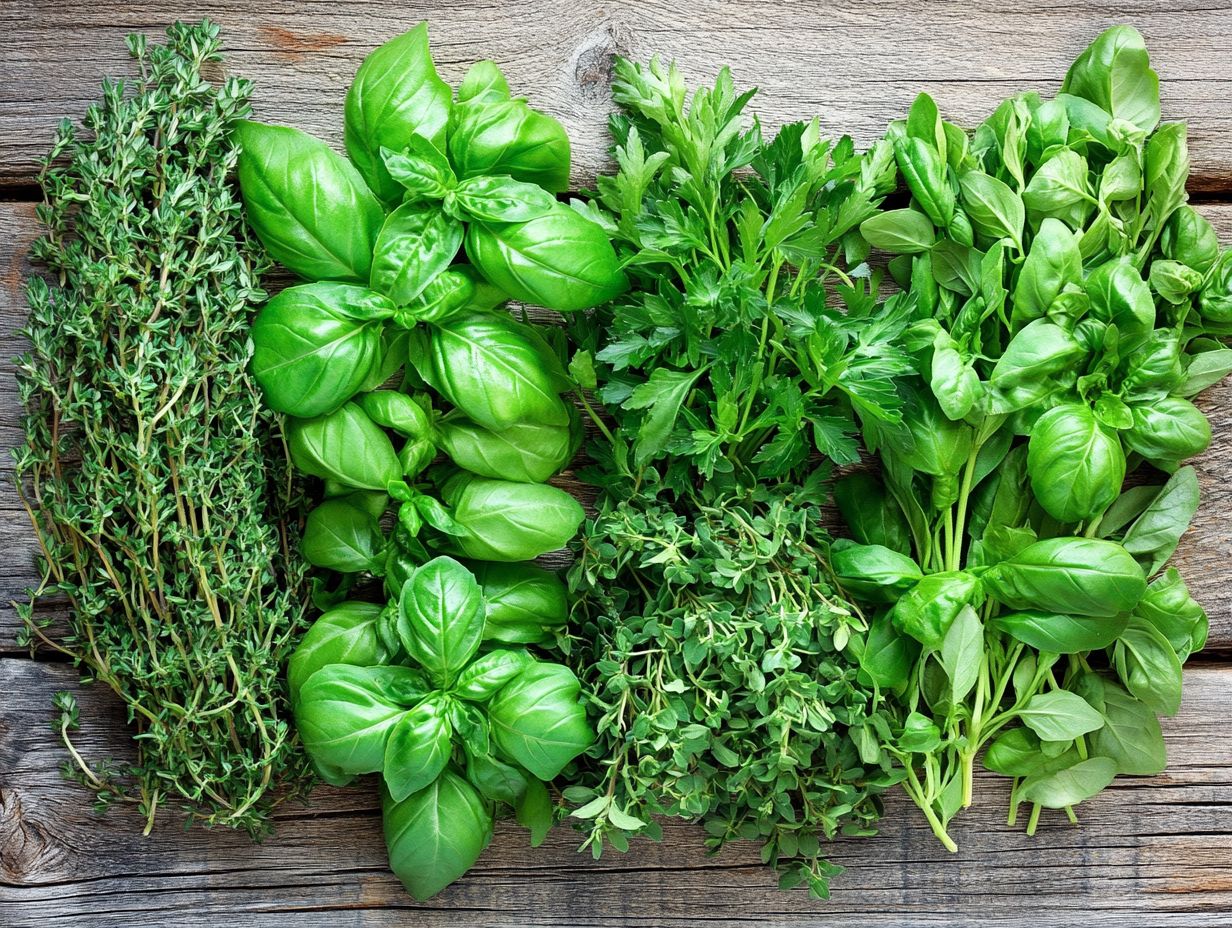
Many herbs, such as turmeric, ginger, and rosemary, offer impressive health benefits. They possess strong antioxidant and anti-inflammatory properties.
Take turmeric for example. Its key component, curcumin, helps reduce inflammation and eases joint pain.
Ginger is often enjoyed in teas and recipes. It contains gingerol, which soothes digestive discomfort and acts as a strong anti-inflammatory.
Rosemary isn t just flavorful; it contains rosmarinic acid, which helps combat inflammatory conditions.
Weaving these herbs into your meals can enhance your holistic health significantly.
How Can One Incorporate These Herbs into Their Diet?
Incorporating herbs like turmeric, ginger, and rosemary into your diet is enjoyable. They not only boost flavor but also add essential nutrients.
Consider adding turmeric to smoothies or making a comforting golden milk. Ginger adds a zesty touch to stir-fries and marinades.
The earthy aroma of rosemary is perfect with roasted vegetables or grilled meats. Try different cooking methods like saut ing or infusing oils to maximize their benefits.
Are There Any Side Effects of Consuming These Herbs?
Herbs like turmeric, ginger, and rosemary are safe in moderation. However, be aware of potential side effects and interactions with medications.
For instance, turmeric may cause stomach discomfort in high doses. If you’re taking blood-thinning medications, be cautious.
Ginger can ease digestion but might also cause heartburn or affect some blood sugar medications. Rosemary could lead to allergic reactions or interact with diuretics.
Always consult a healthcare professional before making significant dietary changes or adding herbal supplements.
What Are Some Other Sources of Antioxidants?
Beyond herbs, many foods are rich in antioxidants. Fruits and vegetables like berries, dark leafy greens, and vibrant vegetables offer essential vitamins and minerals.
Berries, especially blueberries and strawberries, are high in antioxidants. Dark leafy greens like spinach and kale also boost your intake.
Blueberries have one of the highest antioxidant ratings among fruits. Combining these with herbal remedies enhances your overall well-being!
Frequently Asked Questions
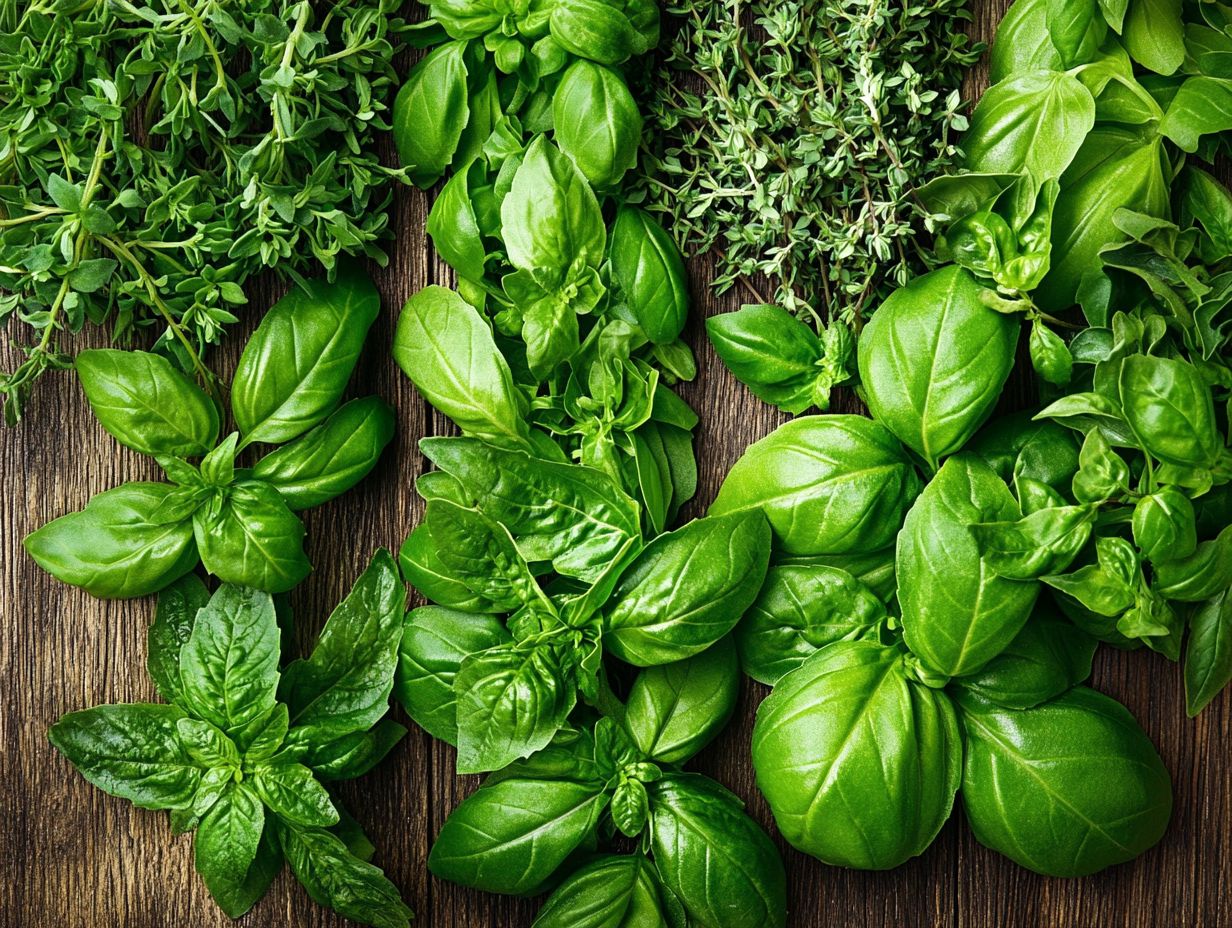
What are the top 5 herbs with antioxidant properties?
The top 5 herbs with antioxidant properties are turmeric, ginger, garlic, rosemary, and oregano.
How do these herbs help fight against oxidative stress?
These amazing herbs contain compounds that act as antioxidants. They help balance free radicals and antioxidants in your body, reducing oxidative stress.
Can these herbs be used as a natural alternative to antioxidant supplements?
You can use these herbs instead of antioxidant supplements. They are rich in antioxidants and have been valued in traditional medicine for their health benefits.
Are these herbs safe for consumption?
Yes, these herbs are generally safe to eat when used in moderation. Always consult a healthcare professional before adding them to your diet.
What other health benefits do these herbs offer?
Aside from their antioxidant properties, these incredible herbs have anti-inflammatory, antimicrobial, and immune-boosting effects. They may also have anti-cancer benefits and aid in digestion.
How can I incorporate these herbs into my daily routine?
You can easily add these herbs to your daily routine by using them in cooking, making teas or infusions, or taking them in supplement form. Just remember to use them responsibly and in recommended doses.

